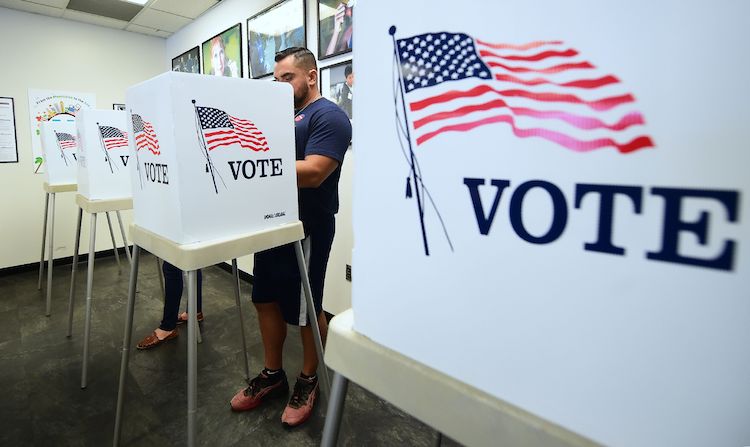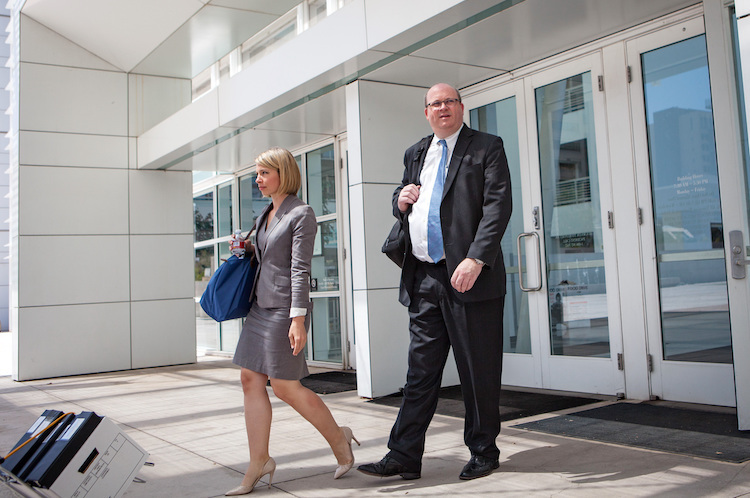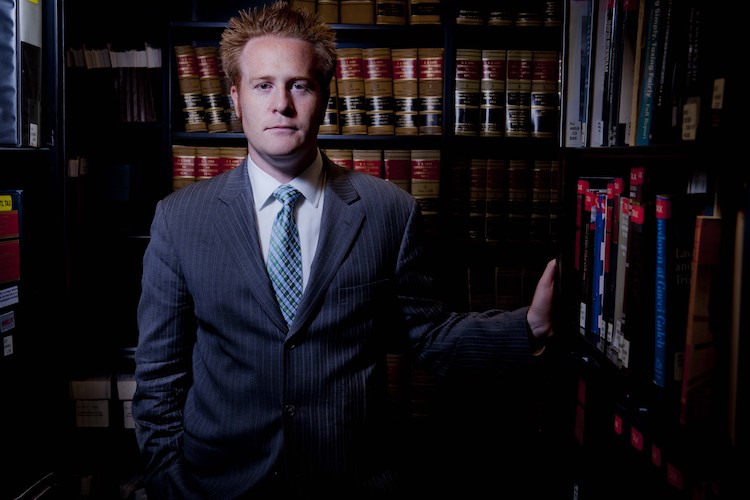Lawyers call on members of the profession to defend voting rights

Voters cast their ballots for early voting at the Los Angeles County Registrar's Office in Norwalk, California, on Nov. 5, 2018. Photo by Frederic J. Brown/AFP via Getty Images.
In late August, Marc Elias, a prominent lawyer on the left fighting against changes to voting laws, announced he was leaving legal giant Perkins Coie and would bring 10 of the firm’s partners and three of its counsel with him.
“It’s not a knock on Perkins, but it’s a large multinational law firm, with lots of different clients and practices,” Elias says. “I wanted to be part of something that was more mission-driven around protecting democracy and expanding voting.”
The move came during a turbulent year in which the legal profession and elite firms have been under increasing pressure to come out more forcefully against a slew of new voting laws; laws that Republican lawmakers say will prevent voter fraud and protect the integrity of elections but Democrats say will make it harder to vote.
“We’re lawyers. If we’re not speaking up for this issue, who will?” says Lauren Stiller Rikleen of Lawyers Defending American Democracy, a group pushing for more attorneys and firms to take action against the restrictions. (Rikleen formerly sat on the ABA Journal’s Board of Editors.)
The Brennan Center for Justice has tallied more than 425 bills proposing changes to voting laws in 49 states. Between Jan. 1 and Sept. 27, 19 states have passed 33 laws.
In June, the groups States United Democracy Center, Protect Democracy and Law Forward identified 216 bills in 41 states that could change election administration. The changes could wrestle power from election officials and into the hands of partisan politicians.
Laws in Georgia, Iowa, Kansas and Texas “impose new or more stringent criminal penalties” on election officials, according to the Brennan Center.
And while states have countered voting restrictions by introducing new laws to expand the vote, efforts at the federal level have fizzled. In October, Republicans blocked a bill called the Freedom to Vote Act and another in November called the John Lewis Voting Rights Advancement Act of 2021. Currently, the overall fate of federal voting rights legislation and Democrats’ chances of success in the next election are intertwined with the party’s efforts to do away with the filibuster. An end to the procedural maneuver, would give Democrats the chance to pass a voting rights bill with a simple majority.
 Attorney Marc Elias exits the Sandra Day O’Connor United States Courthouse in Phoenix with attorney Amanda Callais in August 2016 after the hearing for his lawsuit against Arizona over voting rights. Photo by David Jolkovski for the Washington Post via Getty Images.
Attorney Marc Elias exits the Sandra Day O’Connor United States Courthouse in Phoenix with attorney Amanda Callais in August 2016 after the hearing for his lawsuit against Arizona over voting rights. Photo by David Jolkovski for the Washington Post via Getty Images.
Elias’ decision to leave Perkins Coie came after a “coalition” of BigLaw firms announced to great fanfare in April that it would fight back against the flurry of new laws. However, despite promises of forming “SWAT teams” for legal action, there have been no new announcements since.
Brad Karp, chairman of New York City-based firm Paul, Weiss, Rifkind, Wharton & Garrison, declined to offer details on the coalition’s legal strategy. But he said in April the firms will challenge the restrictions in court, and that Paul Weiss would have spoken out “no matter what.”
“The coalition will be careful not to wade deeply into the political morass but try to focus on the constitutional issues associated with the right to be able to participate fully in our democracy,” Karp said.
Separate from the coalition, Paul Weiss lawyers were part of the legal team that challenged a North Carolina voter ID law that a state court ruled in September discriminated against Black voters.
The Journal contacted 13 of the firms in the coalition regarding its progress in the summer and fall. Most did not respond directly to questions about the coalition’s activities. In August, Karp and another coalition member, Akin Gump Strauss Hauer & Feld chair Kim Koopersmith, said they had nothing further to add about its plans.
Before he left Perkins Coie, Elias had already challenged voting restrictions in several states. The Elias Law Group is involved in more than 30 cases involving voting rights and redistricting. Elias, who was general counsel for Hillary Clinton during her 2016 election campaign, was not invited to join the coalition.
“The legal profession is capable of making real change when it wants,” Elias says. “The question for me is whether the legal profession wants to take action on a widespread basis, or whether it wants to just issue a press release.”
‘A major failure’
Estelle Rogers, chair of the American Bar Association’s Standing Committee on Election Law and also a member of Lawyers Defending American Democracy, is discouraged by the reluctance of bar associations to say “very much of anything” on voting rights and calls it a “major failure.” As for BigLaw firms, she believes many of them hold back because they are worried about alienating clients, members and associates.
“If this were couched as the fundamental threat to our system of government and values I think it is, I don’t think there’s any excuse to be timid,” Rogers says. “But if it is couched as, ‘Oh, the Republicans are filing these bills, and the Democrats hate them,’ that’s something else again.”
Trump’s baseless claims that the 2020 election was stolen and his efforts to overturn the will of millions of voters—which culminated in the attack on the Capitol on Jan. 6—have signaled the beginning of a new era in the fight for voting rights. But post-Trump, the issue of election security and voting rights no longer folds neatly across party lines.
As Trump challenged November’s election results, some Republican officials refused to buy into the myth that widespread voter fraud was commonplace. Conservative judges were among those on the bench who dismissed Trump’s lawsuits.
All the same, for Democrats and many voting rights advocates who are pushing to expand access to the polls, the new bills and laws echo Trump’s unfounded claims that the election was stolen.
 Matthew Sanderson of Caplin & Drysdale. Photo by Jeffrey MacMillan/Getty Images.
Matthew Sanderson of Caplin & Drysdale. Photo by Jeffrey MacMillan/Getty Images.
Matthew Sanderson of Caplin & Drysdale, who is also part of the ABA Standing Committee on Election Law, has previously represented Sen. John McCain and Sen. Mitt Romney. Sanderson says conservative lawyers should speak out against claims that the election was rigged. He traces a line between Trump’s claims about election fraud and the laws being passed in Republican-led statehouses.
“I think it’s unconscionable that more conservative lawyers haven’t come forward. If you don’t come forward, it’s showing you’re unwilling to stand up for democracy and the rule of law,” Sanderson says.
Lawyers in the fight
Still, plenty of conservative lawyers are ready to line up to support the new laws, including Cleta Mitchell, a Republican attorney who has worked for decades on election law cases. Mitchell also advised Trump during his Jan. 2 phone call to Georgia Secretary of State Brad Raffensperger. During that call, Trump pressured Raffensperger to “find” him 11,780 votes to help overturn Joe Biden’s narrow victory in the battleground state.
Shortly after, Mitchell resigned as a partner of the firm Foley & Lardner. Later, the libertarian group FreedomWorks tapped her to head its National Election Protection Initiative. She also leads the Election Integrity Coalition for the Conservative Partnership Institute, which has been lobbying for changes to voting laws. Neither of the groups responded to requests for interviews.
In these roles, Mitchell says she will support initiatives to educate poll workers and poll watchers, register voters and clean up voter rolls.
“You want to call that voter suppression? Fine. I want to suppress any illegal vote,” Mitchell says. “I want to make sure that people are registered and voting, and I want to make sure that they’re doing so legally.”
Speaking to the ABA House of Delegates in August as part of a panel on voting rights, Republican election lawyer Benjamin L. Ginsberg argued that media coverage of the new laws was “overheated.” He noted that while some states, including Georgia and Texas, would reduce early voting days, they still have more days than blue states such as New York and in Connecticut, which has none.
“Proportionality has to be kept in mind,” said Ginsberg, who co-chaired the bipartisan Presidential Commission on Election Administration from 2013 to 2014.
Charles Bell is an election law expert, conservative lawyer and a member of the ABA Standing Committee on Election Law. As lawyers defend the restrictions, Bell expects them to focus on the “menu” of available options that make it more convenient for people to cast their ballots. That includes early voting, mail-in ballots, drop boxes, voting centers and absentee ballots. Bell says lawyers will make the case that while there might be restrictions, the “overall system has a lot of voting opportunities.”
Looking ahead
In July, the Supreme Court gave tacit approval to this strategy when the majority conservative court upheld Arizona’s voting restrictions in Brnovich v. Democratic National Committee, the most consequential ruling on voting rights since 2013.
“Where a state provides multiple ways to vote, any burden imposed on voters who choose one of the available options cannot be evaluated without also taking into account other available means,” Justice Samuel Alito wrote.
At issue in Brnovich was Section Two of the Voting Rights Act, which some election law experts say is the law’s last shred of protection against racial discrimination after the high court effectively gutted Section Five of the law in the 2013 case, Shelby vs. Holder. Under Section Five, the Justice Department had oversight on voting laws in states and jurisdictions with a history of racism and discrimination. Shelby ended that oversight but left the door open for lawsuits under Section Two, allowing people to challenge laws that discriminate against voters.
The Supreme Court stopped short of striking down Section Two. But it ruled that restrictions criminalizing the practice of collecting ballots in batches—which critics call “ballot harvesting”—and discarding ballots cast in the wrong precincts were not discriminatory.
The court used five “guideposts” for assessing voting restrictions, including the burden they place on voters, how widely similar restrictions are used in other parts of the country, and a state’s rationale for introducing the changes. Under the new guidelines, the court found the restrictions were not unlawful and that the state had a valid interest in protecting against voter fraud and intimidation.
In a dissenting opinion, Justice Elena Kagan said the court had stacked “the deck against minority citizens’ voting rights.”
“It [the court] decides this case in an era of voting-rights retrenchment—when too many states and localities are restricting access to voting in ways that will predictably deprive members of minority groups of equal access to the ballot box,” Kagan wrote.
In June, Republicans in the Senate filibustered a federal bill called the For the People Act, which would give more power to independent commissions to redraw voting districts, open up early voting and make voter registration automatic.
In September, Democrats introduced a pared down version of the For People Act called the Freedom to Vote Act. Republicans blocked it in October, calling it the ‘Freedom to Cheat’ Act. Voting rights advocates were also pinning their hopes on the John Lewis Voting Rights Advancement Act, but it failed to advance through the Senate in November. It has a narrower focus; to revive the Voting Rights Act after the Supreme Court’s rulings in Shelby and Brnovich.
Amid the partisan gridlock, Rikleen would like to see bar associations and firms get more actively involved in supporting the federal legislation by engaging the public through the media and civic organizations.
“We need the voice of the profession to say to Congress you have to pass legislation to protect voters because the states right now are doing everything possible to suppress voting rights,” Rikleen says.
The Biden administration has also come under pressure to act on voting rights, and the Justice Department has filed lawsuits challenging restrictions in Texas and Georgia.
At the ABA’s annual meeting, Michigan Secretary of State Jocelyn Benson, a Democrat, urged ABA members to become election workers and use their legal expertise to ensure elections are administered fairly. She also pleaded with lawyers to hold accountable attorneys who spread false claims about elections.
The ABA also adopted a resolution recommending funding and guidelines to protect the integrity of elections. A second adopted resolution allows lawyers to earn continuing legal education credit if they serve as poll or election workers.
Elias says it’s possible law firms might pay a political price for working on election law cases. But amid the economic hardship and devastation caused by the pandemic, he says “no one should cry for lawyers” or rich law firms.
“When history is written, no one is going to care whether you close the biggest deal or you protected the most lucrative patent,” Elias says. “Your children will want to know what you did when democracy was under attack. Democracy doesn’t need your thoughts and prayers. It needs your action.”



